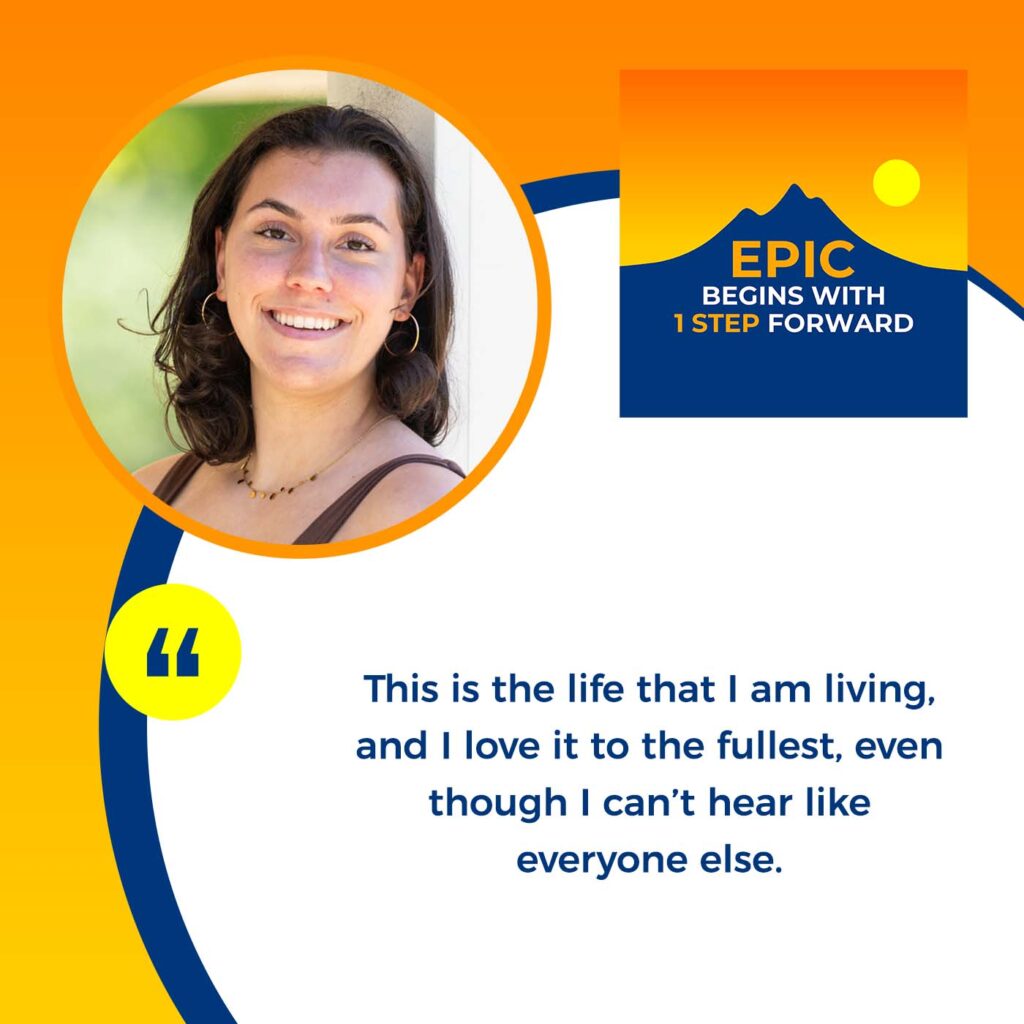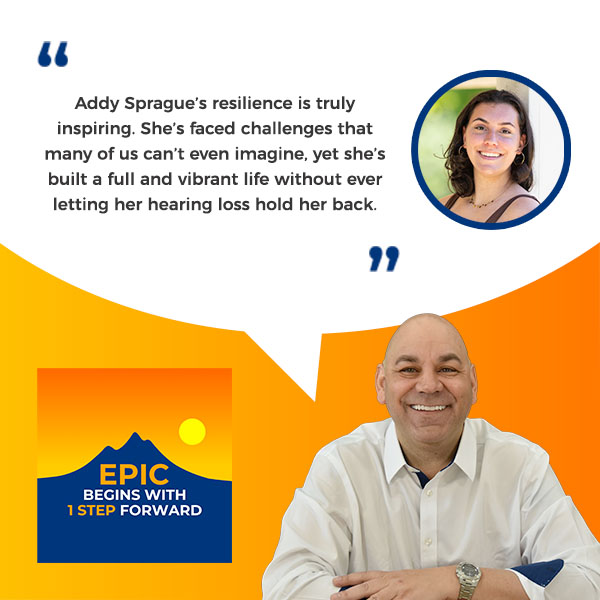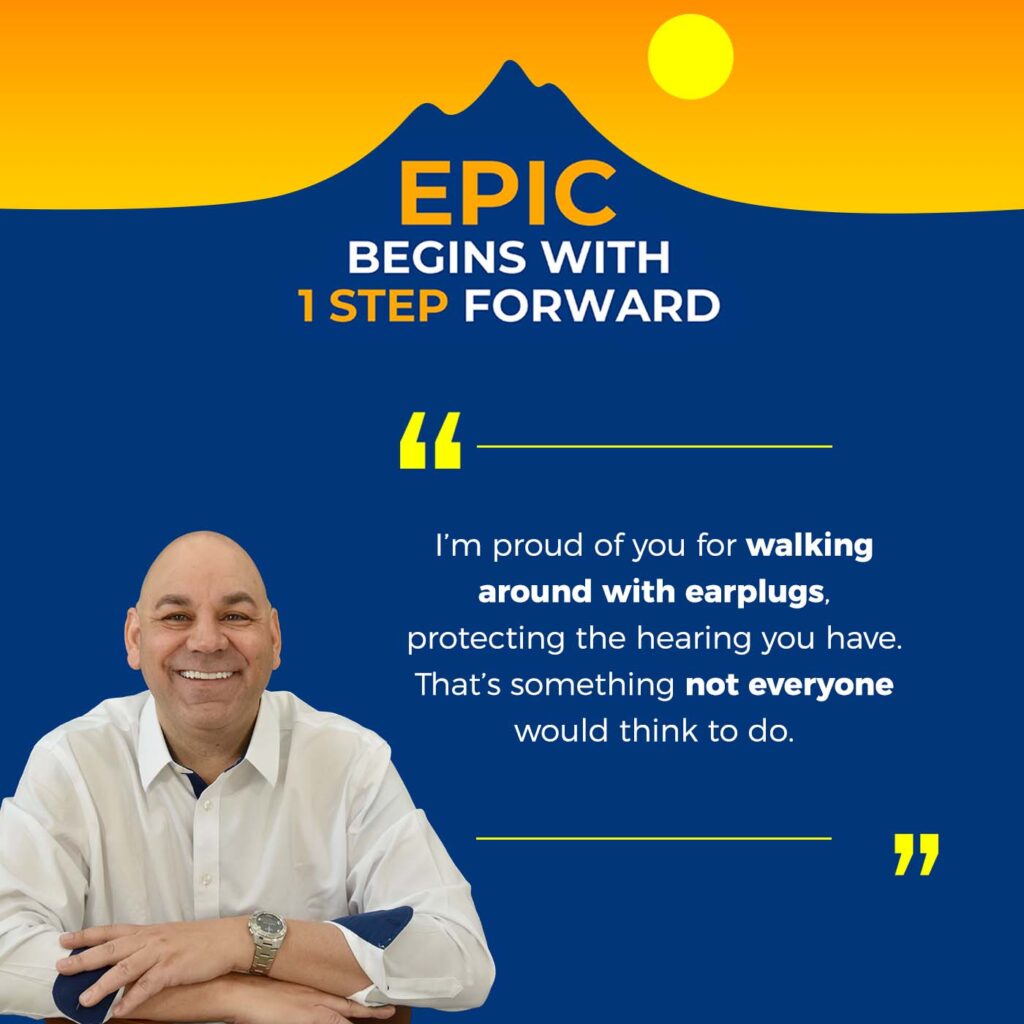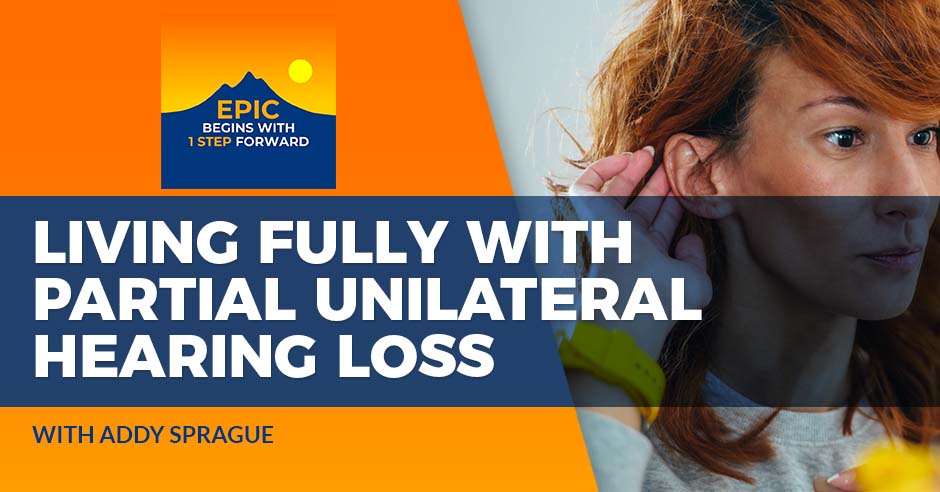Addy Sprague was born with partial unilateral hearing loss, but she has not allowed this to stop her from living a full and enriching life. In this episode, Addy opens up about her journey of overcoming the unique challenges that come with her condition. She shares her personal experiences of navigating everyday life, from school to social interactions, while offering practical advice for others on how to better communicate and engage with individuals who have hearing impairments.
—
Watch the episode here
Listen to the episode here
Living Fully With Partial Unilateral Hearing Loss With Addy Sprague
Introduction To Addy’s Hearing Loss
Welcome back to a really special episode. I am joined by my daughter, Adelaide, or as we like to call her, Addy. How are you? Thank you so much for joining your dad on his show. The reason I have Addy on here, aside from the fact that she is totally epic, is that when Addy was born, we discovered that she had a partial unilateral hearing loss. I’m going to let Addy describe what that is, and then we’re going to talk about what it is for her to be on this epic journey of going through life, not necessarily hearing 100%. Addy, tell us a little about your partial unilateral hearing loss, and then we’ll take it from there.
Partial unilateral hearing loss, partial meaning not fully, so I can hear a little bit out of my ear, uni meaning one, so one-sided lateral side. Not fully hearing out of one side, which is my right ear. As my dad said, I was born with it. I really know no different. This is the life that I am living and the life that I was given. I live it to the fullest and the best that I can, considering maybe I can’t hear the same as my counterparts, but I really do feel like I am able to hear and experience the world fully and live a wonderful life.

Can you describe a little more about specifically where your hearing loss is in terms of sounds, and the challenges that you face on the daily?
Challenges With Softer Sounds And Using Hearing Aids
Yes. I can hear loud sounds, but quiet sounds and certain softer sounds are harder for me to hear because my ear can’t pick them up. I am fortunate, though, that my left ear is still functioning 100%, so a lot of times, I can still hear the sounds as long as my left ear is able to pick up the residual sounds going around. If it’s coming directly into my right ear, which is the ear that I have my hearing loss in, it is harder for me to hear.
I do wear a hearing aid, which helps amplify the sounds and makes it easier for me to hear. Throughout school, I have had an FM system, which is where the teacher wears a little microphone and I have a receiver on my hearing aid and it transmits the sound from the microphone directly to my hearing aid, which made it really easy to understand my teachers.
I know some of my teachers would pass it around the class if we were doing a share so that I would be able to hear completely and hear fully what my classmates are saying. Some people do speak a little softer, and that makes it harder to hear sometimes. That’s one of the challenges, picking up sounds. I usually try to position myself in a spot where I can hear, so I usually put my left ear to a majority of the class if possible.
Navigating challenges with hearing loss is about adaptation, not limitation. I’ve learned to position myself in ways that help me hear and understand.
Now that I’m in college, it does get a little trickier to position myself in spots where I can hear everybody, so I tend to rotate myself so that I can see what they’re saying because I also read lips, which during COVID, produced a little bit of an issue when I wasn’t able to see what people were saying, so that was a challenge that COVID arose with.

We were going to go into that. I have a couple of questions about that for you because I think it is interesting. It’s something that we probably haven’t thought about. Hold on to that for a moment.
I do try to accommodate myself. If I can’t hear, I usually will ask someone to repeat it. Some people are a bit nicer than others, but for the most part, once I find out that I have a hearing loss, everyone is very accommodating and willing to help me with whatever I need.
One of the things that I know, because I’m your dad and I’ve known you your whole life, is that one of the things, again, that we don’t even think about, those of us who have all of our hearing, is that sometimes you have a hard time triangulating sound that’s coming from behind you. Can you take a moment and talk about what that challenge is, how you’ve adapted, or what you’ve found to help overcome that?
Yeah. There’s a game we played at one of the camps where we had to close our eyes and triangulate sound. Obviously, I lost that game because I could not triangulate sound because my left ear takes up the majority of the sound, so it sounds like everything is coming from my left side when it could be coming from my right or even behind me. It does pose a challenge, as you stated. I tend to circle, so I’ll rotate my head and my body to try to figure out where the sound is coming from. I usually will locate it with my left ear going towards where I think the sound is coming from. Even through rotating my head and my body, it still does get tricky to try to locate sound. I do the best I can and hope that the sound either starts again or that someone around me is able to point me to where the sound is coming from.
Definitely. As you had alluded to, when we had the pandemic, that presented, because you were in high school, some probably unthought-of challenges. I’d love for you to share some of those challenges that I certainly hadn’t thought about until you mentioned them. People might be like, “Oh, that’s logical,” but what were some of the challenges?
COVID-19 Mask Challenges For Lip Readers
Yes. One challenge that everyone experienced was not being able to read facial expressions, but for someone who is hard of hearing or even deaf and reads lips, when you cover up that mouth, it makes it extremely difficult to grasp what someone is saying. A lot of times, when I can’t hear, I still can understand by watching the way people’s mouths move. Twenty years of watching people’s mouths move, I’ve got very good, I would say, at picking up what certain sounds look like and what they should sound like coming out of someone’s mouth. During COVID, when we had the masks, obviously, I couldn’t see.
That made it particularly challenging in school, especially when I was learning a second language such as Spanish. I couldn’t do as well because I couldn’t see what the instructor said. That made it hard for me to understand, especially listening. One of the key things in learning another language is being able to hear and understand the language, which was already a challenge for me before the pandemic. You add the masks, and you can’t understand what someone is saying, so that makes it extremely difficult.
Even in my science classes or my English or history classes, I would have to ask a lot of times for people to repeat themselves a little louder. It also made it tricky because at my school, we had the doors and windows open, and we had air filters going. There was a lot of peripheral sound going on, which interfered with me trying to hear what someone was saying. A lot of it was really advocating for myself and being like, “Hey, can you repeat that a little bit louder? I didn’t catch that,” or, “Can you say that again? I really didn’t understand.”
One of the things I know that we talked about is that, in general, wearing masks muffles your voice anyway. It makes it, again, that much more challenging. However, when you went to the hybrid classes, where some days you were in the classroom and other days you were on Zoom and other people were in the classroom, did that present even more challenges for you?
Yeah. It was especially tricky because I wouldn’t be able to hear what my classmates were saying. My teachers, professors, and instructors still wanted me to participate with the class. If I can’t hear what someone’s saying, it makes it hard to build upon their point or to make sure that I’m not repeating the same point they brought up or even asking questions because I didn’t hear what was being said. The hybrid classes, where people were in person and I was online or vice versa, did pose an extra challenge as well.
Also, not to mention that people had masks on. We were again running into that issue of not being able to see their lips, so you can’t even read the lips. Some people were scared and had two masks on, making it even more challenging. Not to mention that even though the school you went to tried to have, I believe they’re called owls or something so that the mic would turn to whoever was speaking, it still was challenging. Even if you could hear fine, if you couldn’t, I can imagine that you were really tired after a day of school because you had to concentrate so much harder to try and hear.
That’s another thing people don’t think about. I think there’s a lot of energy required to try to figure out where sound is coming from and to try to hear. Going a full day, my school did cut down to half days, but even a half day, I was wiped by the end of the day trying to figure out what people were saying, trying to figure out where the sound was coming from, and listening so I could get the information that I needed to excel in my classes.
Definitely. What would you want people to know about people with hearing loss, a hearing impairment, or something that they may not think about? Obviously, no one knows, unless they perhaps see your hearing aid, that you would have anything wrong with your hearing. Again, there’s not that much wrong with your hearing. It’s just, again, a partial, mild hearing loss on one side.
Tips For Interacting With The Hearing Impaired
Normal people, most of the time, even if it is like you’re deaf or you have a partial hearing loss, you don’t need to scream at us. A lot of times, if you get closer and say what you want to say but make sure that you’re enunciating what you’re saying and that you’re not trying to mumble or anything, we’ll be fine. If we ask you to repeat yourself, it’s not us being rude. It’s not us not paying attention. We didn’t catch what you were saying, and you don’t need to be mean about it. The other thing is accommodating.
Don’t scream at us! Just be clear and patient. We may ask you to repeat yourself, not because we aren’t listening, but because we couldn’t hear.
It is really hard to hear in restaurants or very loud settings, so making sure that you are positioning yourself on the side where maybe they have a better hearing is always helpful. Instead of the hearing-impaired person always having to position myself, it is a lot of mental energy and mental work. At restaurants, I want to make sure that I can hear everybody. I always have to logistically flip things in my mind to figure out where I should sit so that I can hear everybody. Taking some of that mental load off of the person who does have a hearing loss is always helpful.
The Benefits Of Self-Advocacy
One of the things that you’ve done, and I’ve watched you do it honestly from when you were in kindergarten and first grade, is you’ve always advocated for yourself. I think also really importantly is you share that you have a hearing impairment and what people need to do. I remember in first grade watching you so bravely get up and say to your classmates, “Here’s what’s going on with me. Here’s what I have to do. If I turn my head and I’m not looking at you, it’s because I want to listen. I read lips.”
Advocating for yourself is key. It’s something I’ve done since kindergarten, and it’s helped me get what I need to succeed in life.
That’s important. I think that’s great. I can’t say I’m an expert, I’m only an expert in you, but I know that your advocating has probably helped you much more than your mother and I could ever help you because you’re in the classroom and know what you need. As you got older, when you were a teenager and you’re in college, did you find it at times hard to advocate for yourself because maybe you were embarrassed or you thought people were going to judge you, or have you always been like, “No, here’s who I am and here’s what I need”?
I’ve never been embarrassed. I’m not usually offering up the information that I have a hearing loss to every single person I meet. There are a lot of times I am able to interact in a normal way that you wouldn’t even know that I have a hearing loss. In college, I don’t usually walk up to my professors and say anything unless, for some reason, I really am struggling because, in the large lecture halls, they’re there to teach. Most of the time, if I get closer to the front of the room, I am able to hear everything. I was lucky enough in high school that the class was fairly small.
I didn’t really have to advocate for myself a ton, but I know that in middle school, when the classes were larger, I definitely had to go up to my teachers and be like, “Hey, here’s how to use the FM system. I need you to use it so that I can hear.” When substitutes would come in, I’d have to explain it to them. It was a lot more and I feel like it was more present when I had the FM system. Due to the small class sizes in high school, I didn’t need an FM system. In college, with my hearing aid and moving closer to the front, I usually am okay with getting the information I need.
Definitely. One of the things that I know is your passion, and I’m interested in how you play on the ultimate team at Syracuse. You’re obviously not wearing your hearing aid when you’re playing. Do you encounter any challenges hearing the whistle or whatever when you’re playing?
Yes. In any sports that I’ve played, I’ve never worn my hearing aids. I played soccer, gymnastics, and lacrosse. I never wore my hearing aid in any of those sports. Hearing my name, if there’s an Abby, a Maddie, I usually respond to all of them because I can’t tell the difference between an M at the beginning of Maddie or a B and D sound very similar when yelled across the field. I do tend to turn sometimes when I don’t hear.
My teammates have been very nice and have called and relayed the message that needs to get to me across the field, which has been very wonderful. I’ve had such great teammates who have been able to accommodate and help me through this. My coaches, I tell them, so they know, and they usually don’t get frustrated because they’re like, “She didn’t hear me.” Again, that goes to the great coaching staff and teammates that I’ve had throughout the years.
Simulating Hearing Loss With Earplugs
Absolutely. I’m curious, and I want to try to simulate your experience somewhat. I remember when you were younger, I put a pretty good sound-blocking earplug into my right ear because I wanted to try and understand what you are and aren’t hearing. Obviously, I can’t do it 100%, but I did certainly get an idea of, “There’s an empty spot there.” I could hear louder things, but the softer sounds, it was described to me when you were a baby and we discovered that it was like rustling leaves and softer sounds like that are the ones that you don’t hear. How would you describe your experience? I know you don’t have anything else to compare it to. It’s not like you’re like, “Here’s the difference,” but how do you experience your hearing loss?
I think it would be very overwhelming if, for some reason, I did get my hearing fully back in that ear. I think my brain would get very overwhelmed because it is so used to and it has adapted to only hearing louder sounds out of my right ear. As I said earlier, I can’t tell the difference between certain sounds because they sound very similar.
The softer sounds, like rustling leaves, are a little bit softer. It makes it harder to hear because it is a softer sound and the type of hearing loss that I have. But it’s that I can’t hear the softer sounds. A bonus, though, that some people don’t really think about is that I do have a natural built-in earplug. If I do put my left ear down on the pillow, I usually can’t hear softer sounds around me, which is very nice when you’re sharing the bed with someone and they’re rolling over. Pros and cons. I can’t hear softer sounds, but I also can’t hear softer sounds, like when I’m sleeping. It’s very nice because I put my left ear down on the pillow and I feel like I sleep a little bit better.
I will absolutely admit there are times when I’m walking with you and I’m talking to you, and I’m on your right side because I forgot. You’re always so gracious and go, “Dad, come to the other side so I can actually hear you and talk to you.” I like to ask all of my guests this question, which is, as you are probably more than aware, I love the concept of not yet. The things that we want to do but haven’t done yet. We dream of doing, or maybe we’re on the path, but we haven’t done. What are 1 or 2 of your not yet?
One of my not yet goals is that I would love to work in Formula One. It’s a high-reaching goal, but I do believe I can make it there with enough hard work and perseverance. My path to that will be however it is, but that is ultimately my goal. I’d love to help young female racers reach their goal of getting into Formula One. I hope that we will soon see more female motorsports racers in high-level motors. That is my big, I think, “not yet,” which is.
What do you want to do in Formula One?
I would love to do the training aspect of it. I’m studying health and exercise science in hopes of becoming a physical therapist to work with high-level teams and athletes. In my undergraduate studies, I’m doing some shadowing, and I’m really excited to go to PT school, physical therapy, to clarify, because I know there are other PTs out there. Physical therapy school and that’s all. Of course, as life goes on, it might pivot, it might change, but as of today, it is to reach Formula One.
I obviously fully support that. I guess a question I have for you is if you’re around Formula One, those cars are really loud. Do you worry? I know you’re not necessarily right out on the track, but do you have concerns about your hearing?
One hundred percent. Even when I go to concerts or parties where the music is really loud, I do get really worried that I will lose hearing. I’ve talked to my audiologist about it, and everyone recommends wearing earplugs to help muffle the sound so it isn’t as loud. That is what I try to do. If I remember, obviously, I am twenty, I go out sometimes and I forget to bring earplugs with me, or you don’t know where you’re going to go and it ends up being really loud or louder than you expected.
That’s why I always try to have earplugs on a key chain so that I always have them with me. With Formula One, yes, I would be very nervous about losing my hearing. My audiologist could tell you that every single time I come in for my yearly appointment, I do tell her that I think I’ve lost more hearing, and she does the test. Turns out I have not, which is very good. I feel sometimes like I am losing my hearing, so I do definitely get very anxious and worried about loud situations and scenarios where I could potentially lose hearing.
Correct me if I’m wrong. I don’t want to sound like I don’t know, but we don’t believe, the audiologists don’t believe, that, aside from some external things like really loud noises, your hearing loss has not progressed as you grew. At this point, they don’t think that it would, except for some damaging external event. Correct?
Yeah. We all lose hearing as we age, as we get older.
I think you have a few years on that. I’m going to say.
Yeah. The type of hearing loss I have can, in some people, cause progressive hearing loss as they go through puberty and as they age into adulthood. I’m lucky that I have not experienced that. My hearing has been stable throughout my entire life, which I’ve been very grateful for because although it would be slowly progressive, it still does suck to lose hearing suddenly. I think if you were to lose it, it is wonderful, and you live your life the way you can, but for me who grew up in a hearing community, I would identify as hard of hearing because I still can hear. I would find it challenging to experience sudden hearing loss. I’m very lucky, and I feel very grateful that my hearing loss is the way it is and that I have not lost any more hearing than I already have.
My hearing loss is stable, and I’m thankful for that. While some worry about progression, I focus on living fully with the hearing I have.
Trust me, I too was concerned, somewhat as you were getting older, when you were 5, 6, 7. I was happy that it wasn’t progressing. I was aware that in adolescence and young adulthood, because of puberty and growth, you sometimes experience more, but you haven’t. I am grateful for that. As your dad, I’m proud of you for walking around with some earplugs to try and make sure that you are protecting what you have.

Conclusion And Final Thoughts
Addy, I want to thank you so much for coming in and sharing so candidly about what you live with every day and sharing information that can help all of us to better, I don’t even want to say accommodate, to better interact with people with some hearing loss, to make their life and our life that much better, richer, and easier.
Thank you for having me.
Of course. Everyone, I want to thank you for reading. Remember, you can go to EpicBegins.com to get all the information to begin your epic journey. If you go there, you can get a free copy of the eBook Epic Begins with One Step Forward: How to Plan, Achieve, and Enjoy the Journey. Remember, epic choices lead to the epic life that you want.
Important Link
About Addy Sprague
 Addy Sprague is a undergraduate student studying Exercise Science. She was born with a unilateral hearing loss, but has not let that stop her from living a life full of adventure and fun. She plays ultimate frisbee for her college and enjoys traveling to explore new places and learn all she can.
Addy Sprague is a undergraduate student studying Exercise Science. She was born with a unilateral hearing loss, but has not let that stop her from living a life full of adventure and fun. She plays ultimate frisbee for her college and enjoys traveling to explore new places and learn all she can.

